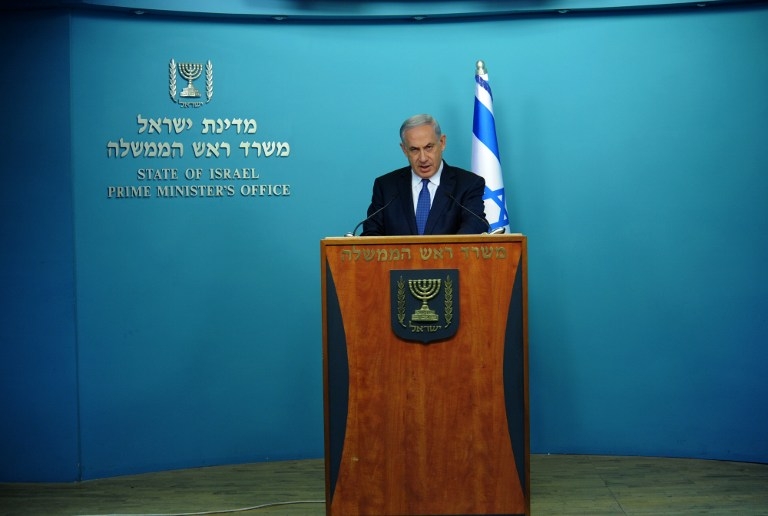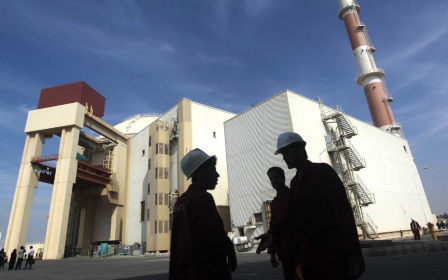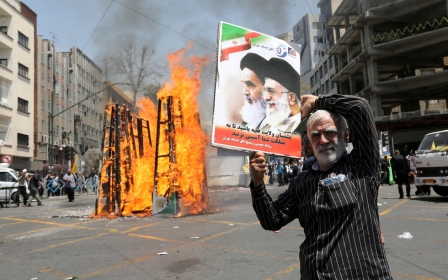In Israel, all eyes on Netanyahu and Washington after Iran deal

As news of the Iran nuclear deal emerged on Tuesday, all three major Israeli television stations cut off their normal programming to discuss what had just happened in Vienna.
“There was a sense of urgency,” TV journalist and former Israeli MK Danny Ben-Simon told MEE, hours after the deal was announced.
It was the kind of thing, said Ben-Simon, one might expect in a time of war. The tone was grim and the message was that the Iran deal was the ultimate capitulation of the west.
“I must say that, in all three channels, the reactions were hysterical,” he said.
After more than a decade of diplomatic dealings, Israelis were not caught off guard by Tuesday’s deal. But it is only now, after the agreement, that real suspense hangs over the country – and the battles in Tel Aviv and the wider one in Washington, DC are poised to begin.
Israeli Prime Minister Benjamin Netanyahu - who has spent much of his political career with the threat of Iran as his focus - was quick to criticise the deal on Tuesday, calling it “a bad mistake of historic proportions”.
In the hours just before and immediately after the announcement, most Israeli politicians and analysts followed Netanyahu’s line – even if they took jabs at the prime minister while saying it.
Naftali Bennett likened Iran to a wrestler that had nearly been defeated – and then helped to his legs at the last minute. “This is a terrible deal and we hope that its still – that the small chance of it being finalised and approved - will not happen.”
Yair Lapid, a former news anchor who heads the secular, Yesh Atid party, called for Netanyahu to resign before the agreement was signed, saying his Iran campaign had been a “colossal failure” and put the blame on Netanyahu’s strident US lobbying.
“In the last year, we weren’t even in the arena. We had no representative in Vienna, our intelligence cooperation was harmed, and the door to the White House was closed to us,” Lapid told Israel’s Army Radio.
Like Lapid, opposition leader Isaac Herzog suggested in a Facebook post on Monday that the deal had moved forward as a result of the tense relationships between Netanyahu and Obama.
“Without consulting Israel. Without updating Israel. Israel’s interests have been forsaken – due, among other reasons, to the personal rift between Netanyahu and the US president.”
On Tuesday, Herzog announced that he would be flying to the US to demand security measures for Israel. “With regard to security, I am more extreme than Netanyahu,” he told the Jerusalem Post.
Netanyahu's Washington strategy?
Indeed, the major focus now for the Israeli public is not the possibility that Iran will still obtain nuclear weapons, but the future of the US-Israeli relationship and how Netanyahu will approach Washington, said journalist and former politician Ben-Simon.
“They are very, very worried about the state of relations with the US,” he said.
Many wonder, he said, what American Jews will do to improve the relationship. “Will they tell Netanyahu that ‘enough is enough’?” Or, he wondered, will they let Netanyahu take the lead, in which case, could Netanyahu try to talk to Congress again?
“If they go with Netanyahu, we are in a deep crisis,” said Ben-Simon.
Other commentators were equally anxious about the precipice on which Netanyahu stands. Netanyahu's spokespeople told Haaretz that the prime minister plans to “kill himself” in an attempt to block Congress from approving the deal.
In Wednesday’s Haaretz, commentator Yossi Verter gave credit to Netanyahu for putting the nuclear issue on the global agenda, but cautioned that the prime minister wants to “wreck on what’s left of US-Israel relations”.
“After losing his pants, he’s now putting his underwear on the roulette wheel in a move that experts on American politics say hasn’t much of a chance,” Verter wrote.
“This is not the time to antagonise the US administration,” Yossi Yonah, a Labour Party MK told MEE. “It’s understandable that we were united behind Netanyahu before the deal, but now we’re saying that we have to be very careful.”
Yonah – who said that the deal is a disappointment across Israel’s political spectrum - said instead of going full throttle with the US administration, Israeli officials should focus on specific details in the agreement that are unsatisfying and have a constructive dialogue to ensure the country’s security.
“We have to get guarantees from our European and US friends that they will minimise the future threats against us,” he said.
Akiva Eldar, a political analyst and columnist for the Al-Monitor website, said one strategy Israel may be seeking to pursue in Washington involves protection under an "American umbrella".
That would mean reaching an agreement specifying that any Iranian attack against Israel would be considered an attack against the United States, he said.
An Israeli official who spoke on condition of anonymity to AFP said discussions will also likely include further cooperation between US and Israeli intelligence to detect any potential violation of the nuclear agreement by Iran.
Some in Israel have however begun to suggest it is time to move on.
"The nuclear deal in the making is far from perfect, but the skies are not going to fall on our head tomorrow," Yossi Melman, who focuses on security issues, wrote in The Jerusalem Post.
MEE's Mary Atkinson contributed to this article.
New MEE newsletter: Jerusalem Dispatch
Sign up to get the latest insights and analysis on Israel-Palestine, alongside Turkey Unpacked and other MEE newsletters
Middle East Eye delivers independent and unrivalled coverage and analysis of the Middle East, North Africa and beyond. To learn more about republishing this content and the associated fees, please fill out this form. More about MEE can be found here.




